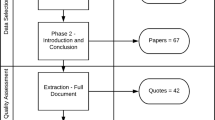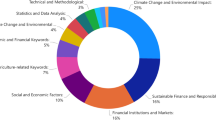Abstract
Market-based instruments, i.e., economic incentives and disincentives, are gaining popularity in environmental policy. However, research on the effectiveness of economic incentives for regulating environmentally relevant consumer behaviour demonstrates convincingly that the implementation of this instrument is based on inadequate assumptions concerning the motivation guiding consumer behaviour. In this paper it is argued that stronger focus should be placed on studying how the regulation instrument influences the perception of the environmentally relevant activity that it was meant to regulate. The attitudes of Danish citizens towards differentiated garbage fees (implying a relatively small economic incentive) and the impact of its implementation on the attitude towards recycling are analysed. The attitude towards differentiated garbage fees is primarily determined by the perceived equity of differentiated garbage fees and its perceived effectiveness with regard to combating waste problems. The most important determinant of the attitudes towards recycling activities is the expected environmental and public benefits. However, empirical support is found for the hypothesis that the use of monetary incentives at the consumer level may “re-frame” the recycling issue into the sphere where private cost-benefit calculations apply. The negative effects of this re-framing can more than outweigh the positive impact of the monetary incentive on attitudes and behaviour.
Zusammenfassung
Monetäre Anreize und UmweltbewuΒtsein. Die Wirkung differenzierter Müllgebühren. Marktkonforme Instrumente wie ökonomische Anreize oder Strafen werden in der Umweltpolitik immer populärer. Allerdings zeigen Forschungsergebnisse über die Wirksamkeit ökonomischer Anreize für die Regulierung umweltrelevanten Konsumentenverhaltens, da\ die Anwendung dieses Instrumentes auf unzweckmä\igen Annahmen über die Motivation beruht, die dem Verbraucherverhalten zugrunde liegt. In diesem Beitrag wird gefordert, da\ die Frage stärker in den Mittelpunkt gerückt werden mu\, wie das Regulierungsintrument die Wahrnehmung des umweltrelevanten Verhaltens beeinflu\t, das reguliert werden soll. Eine empirische Studie untersucht die Einstellungen dänischer Bürger gegenüber differenzierten Abfallgebühren (die einen relativ kleinen ökonomischen Anreiz bieten) und die Wirkung dieser Ma\nahme auf die Einstellung gegenüber der Wiederverwertung. Die Einstellung zu differenzierten Müllgebühren wird in erster Linie durch ihre wahrgenommene Gerechtigkeit bestimmt und durch ihre wahrgenommene Wirksamkeit gegenüber den Müllproblemen. Die wichtigsten Determinanten der Einstellung gegenüber der Müllwiederverwertung sind ihre erwarteten allgemeinen Umweltvorteile. Allerdings sprechen die Daten für die Hypothese, da\ monetäre Anreize das Thema der Müllwiederverwertung auf Verbraucherebene auf das Niveau privater Nutzen-Kosten-Kalkulationen herunterdrücken. Die negativen Effekte dieser Verschiebung könnten die positiven Wirkungen monetärer Anreize auf Einstellung und Verhalten sogar überkompensieren.
Similar content being viewed by others
References
Ajzen, I., & Fishbein, M. (1980).Understanding attitudes and predicting social behavior. Englewood Cliffs, NJ: Prentice-Hall.
Allen, J., Davis, D., & Soskin, M. (1993). Using coupon incentives in recycling aluminum: A market approach to energy conservation policy.Journal of Consumer Affairs, 27, 300–318.
Anonymous (1982). The public's opinion of recycling.Resource Recycling, May/June, pp. 6–7.
Bagozzi, R. P. (1984). Expectancy-value attitude models. An analysis of critical measurement issues.Internationaljournal of Research in Marketing, 1, 295–310.
Brehm, J. W. (1966).A theory of psychological reactance. New York: Academic Press.
Brisson, I. (1993). Packaging waste and the environment: Economics and policy.Resources, Conservation and Recycling, 8, 183–292.
Conn, D. W. (1988). Reducing municipal solid waste generation. Lessons from the seventies.Journal of Resource Management and Technology, 16(1), 24–27.
Cook, S. W., & Berrenberg, J. L. (1981). Approaches to encouraging conservation behavior: A review and conceptual framework.Journal of Social Issues, 37(2), 73–107.
Dawes, R. M. (1980). Social dilemmas.Annual Review of Psychology, 31, 169–193.
De Young, R. (1985–86). Encouraging environmentally appropriate behavior: The role of intrinsic motivation.Journal of Environmental Systems, 15, 281–292.
De Young, R. (1986). Some psychological aspects of recycling. The structure of conservation satisfaction.Environment and Behaviour, 18, 435–449.
De Young, R. (1990). Recycling as appropriate behavior: A review of survey data from selected recycling education programs in Michigan.Resources, Conservation and Recycling, 5, 1–13.
De Young, R., & Kaplan, S. (1985–86). Conservation behavior and the structure of satisfactions.Journal of Environmental Systems, 15, 223–292.
Dunlap, R. E., & Scarce, R. (1991). The polls-poll trends: Environmental problems and protection.Public Opinion Quarterly, 55, 651–672.
Econet A/S (1993a).Differentierede renovationsgebyrer. Kortl∄gning og vurdering af differentierede renovationsgebyrer for dagrenovation (Differentiated garbage fees. Mapping and evaluating differentiated garbage fees for refuse). Copenhagen: The National Agency of Environmental Protection. Environment project No. 241.
Econet A/S (1993b).Kortlcegning af differentierede renovationsgebyrer (Mapping differentiated garbage fees). Copenhagen: The National Agency of Environmental Protection. Working report No. 39.
Etzioni, A. (1988).The moral dimension. Toward a new economics. New York: The Free Press.
Eurostat (1993).Environment statistics 1991. Luxembourg: Eurostat, Directorate F. 8C.
Fazio, R. H. (1986). How do attitudes guide behavior? In: R. M. Sorrentino & E. T. Higgins (Eds.),The handbook of motivation and cognition: Foundations of social behavior, pp. 204–243. New York: Guilford Press.
Festinger, L., & Carlsmith, J. M. (1959). Cognitive consequences of forced compliance.Journal of Abnormal and Social Psychology, 58, 203–210.
Fishbein, M. & Ajzen, I. (1975).Belief, attitude, intention, and behavior. Reading, MA: Addison-Wesley.
Frank, R. H., Gilovich, T., & Regan, D. T. (1993). Does studying economics inhibit cooperation?Journal of Economic Perspectives, 7, 159–171.
Frey, B. S. (1993). Motivation as a limit to pricing.Journal of Economic Psychology, 14, 635–664.
Goffman, E. (1974).Frame analysis. Cambridge, MA: Harvard University Press.
Grunert, S. C. (1993). Green consumerism in Denmark: Some evidence from the ØKO foods-project.Der Markt, 32(3), 140–151.
Harrison, D. (1993). Who wins and who loses from economic instruments?The OECD Observer, No. 180, February/March, pp. 29–31.
Heberlein, T. A., & Warriner, G. K. (1983). The influence of price and attitude on shifting residential electricity consumption from on- to off-peak periods.Journal of Economic Psychology, 4, 107–130.
Helson, H. (1964).Adaptation level theory. New York: Harper & Row.
Hirsch, F. (1976).Social limits to growth. Cambridge, MA: Harvard University Press.
Hirschman, A. O. (1982). Rival interpretations of market society: Civilizing, destructive, or feeble?Journal of Economic Literature, 20, 1463–1484.
Hopper, J. R., & Nielsen, J. M. (1991). Recycling as altruistic behavior. Normative and behavioral strategies to expand participation in a community recycling program.Environment and Behavior, 23, 195–220.
Johansson, M. G. (1993).Et adf∄rdsteoretisk grundlag for regulering af husholdningernes affaldsbortskaffelse (A behavioral science framework for regulation of the households' waste disposal). Aarhus: The Aarhus School of Business, Department of Marketing. Ph.D. thesis.
Kahle, L. R., & Beatty, S. E. (1987). Cognitive consequences of legislating postpurchase behavior: Growing up with the bottle bill.Journal of Applied Social Psychology, 17, 828–843.
Katzev, R. D., & Johnson, T. R. (1984). Comparing the effects of monetary incentives and foot-in-the-door strategies in promoting residential energy conservation.Journal of Applied Social Psychology, 14, 12–27.
Katzev, R. D., & Pardini, A. U. (1987). The comparative effectiveness of reward and commitment approaches in motivating community recycling.Journal of Environmental Systems, 17, 93–113.
Levitt, L., & Leventhal, G. (1986). Litter reduction — How effective is the New York State bottle bill?Environment and Behavior, 18, 467–479.
Liebrand, W., Messick, D., & Wilke, H. (Eds.) (1992).Social dilemmas. Theoretical issues and research findings. Oxford: Pergamon Press.
McClelland, L., & Canter, R. J. (1981). Psychological research on energy conservation: Context, approaches, methods. In: A. Baum & J. E. Singer (Eds.),Advances in environmental psychology, Vol. 3. Energy conservation: Psychological perspectives. Hillsdale: Erlbaum.
MiljØministeriet (1989).Handlingsplan for Øget genanvendelse 1990–92 (Action plan for increased recycling 1990–92). Copenhagen: The Ministry for the Environment.
Moore, W. K., & Scott, D. L. (1983). Beverage container laws: A survey of the issues and results.Journal of Consumer Affairs, 17, 57–80.
Naughton, M., Sebold, F., & Mayer, T. (1990). The impacts of the California beverage container recycling and litter reduction act on consumers.Journal of Consumer Affairs, 24, 190–220.
OECD (1989).Economic instruments for environmental protection. Paris: OECD.
Olson, M. (1965).The logic of collective action. Cambridge, MA: Harvard University Press.
Pearce, D. W., & Turner, R. K. (1993). Market-based approaches to solid waste management.Resources, Conservation and Recycling, 8, 63–90.
Pieters, R. (1988). Attitude-behavior relationships. In: W. F. van Raaij, G. M. van Veldhoven, & K. E. Wärneryd (Eds.),Handbook of economic psychology, pp. 144–204. Dordrecht: Kluwer.
Pieters, R. G. M. (1989).Attitudes and behaviour in a source separation program. A garbology approach. Delft: Euburon.
Platt, J. (1973). Social traps.American Psychologist, 28, 641–651.
Ritchie, J. R. B., & McDougall, G. H. G. (1985). Designing and marketing consumer energy conservation policies and programs: Implications from a decade of research.Journal of Public Policy & Marketing, 4, 14–32.
Schoemaker, P. J. H. (1982). The expected utility model: Its variants, purposes, evidence, and limitations.Journal of Economic Literature, 20, 529–563.
Schwartz, S. H. (1970). Moral decision making and behavior. In: J. Macauley & L. Berkowitz (Eds.),Altruism and helping behavior, pp. 127–141. New York: Academic Press.
Schwartz, S. H. (1977). Normative influence on altruism. In: L. Berkowitz (Ed.),Advances in experimental social psychology, Vol. 10, pp. 221–279. New York: Academic Press.
Snow, D. A., Rochford Jr., E. B., Worden, S. K., & Benford, R. D. (1986). Frame alignment processes, micromobilization, and movement participation.American Sociological Review, 51, 464–481.
Stern, P. C. (1978). When do people act to maintain common resources? A reformulated psychological question for our times.International Journal of Psychology, 13, 149–158.
Stern, P. C., & Gardner, G. T. (1981). Psychological research and energy policy.American Psychologist, 36, 329–342.
Stern, P. C., & Kirkpatrick, E. M. (1977). Energy behavior: Conservation without coercion.Environment, 10, 10–15.
ThØgersen, J. (1994). A model of recycling behaviour. With evidence from Danish source separation programmes.International Journal for Research in Marketing, 11, 145–163.
Uusitalo, L. (1989). Economic man or social man — exploring free riding in the production of collective goods. In: K. G. Grunert & F. ölander (Eds.),Understanding economic behaviour, pp. 267–283. Dordrecht: Kluwer.
Weiner, J., & Brehm, J. W. (1966). Buying behavior as a function of verbal and monetary inducement. In: J. W. Brehm (Ed.),A theory of psychological reactance. New York: Academic Press.
Wiener, J. L., & Doescher, T. A. (1991). A framework for promoting cooperation.Journal of Marketing, 55(2), 38–47.
Wilkie, W. L., & Pessemier, E. A. (1973). Issues in marketing's use of multi-attribute attitude models.Journal of Marketing Research, 10, 428–441.
Zaltman, G. (1974). Strategies for diffusing innovations. In: J. N. Sheth & P. L. Wright (Eds.),Marketing analysis for societal problems, pp. 78–100. Urbana-Champaign: The University of Illinois.
Author information
Authors and Affiliations
Additional information
The research reported in this paper was sponsored by grants from the Danish Environmental Protection Agency and the Danish Social Science Research Council.
Rights and permissions
About this article
Cite this article
ThØgersen, J. Monetary incentives and environmental concern. Effects of a differentiated garbage fee. J Consum Policy 17, 407–442 (1994). https://doi.org/10.1007/BF01022912
Issue Date:
DOI: https://doi.org/10.1007/BF01022912




